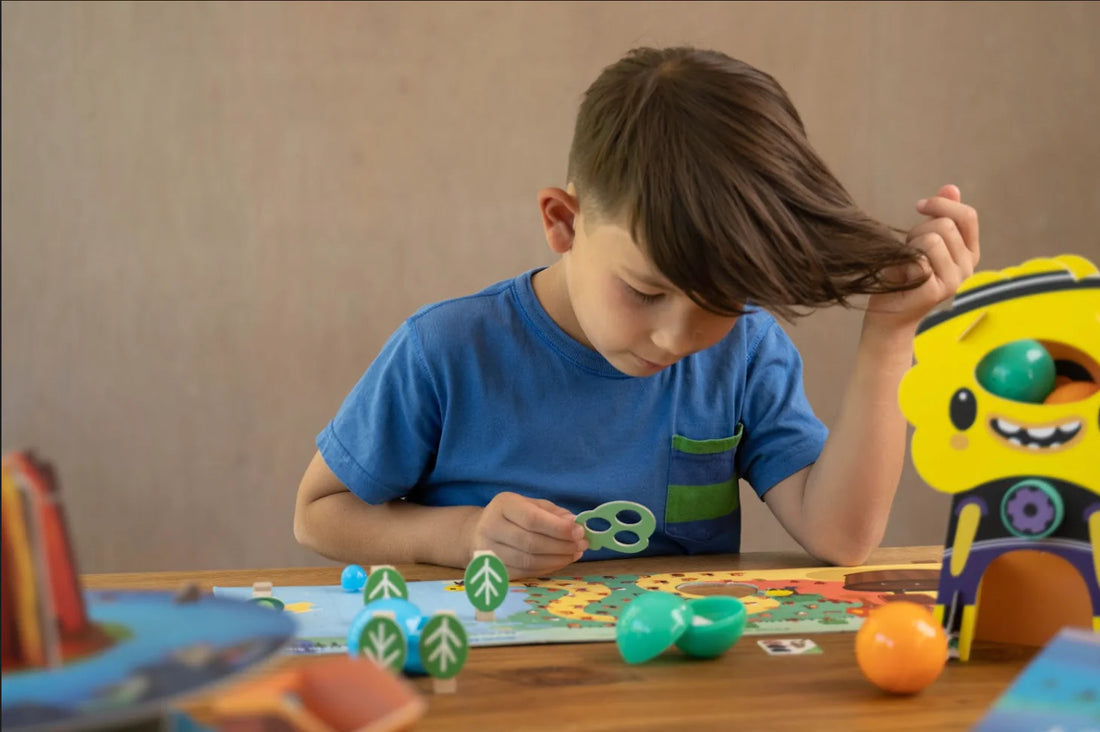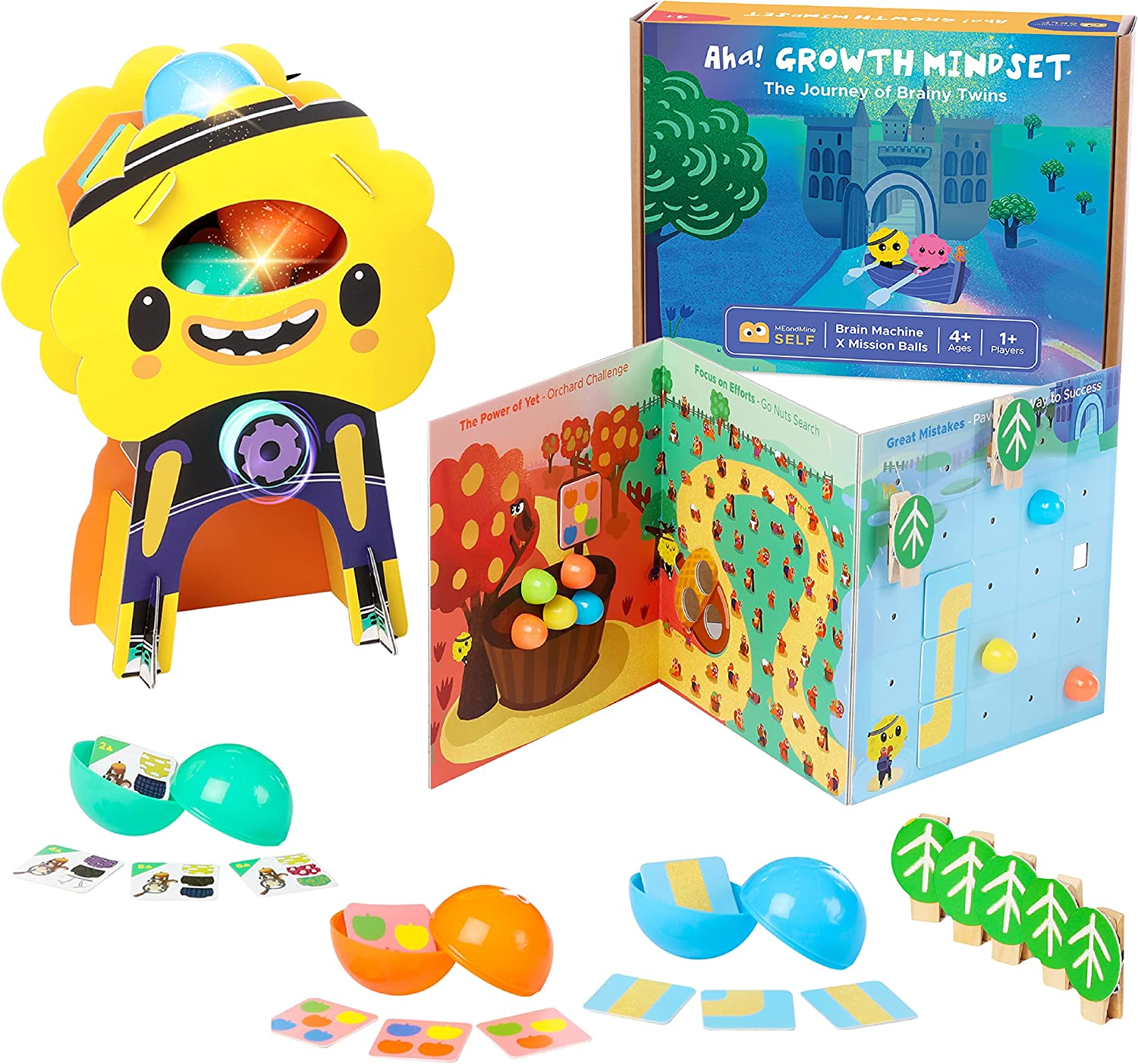
Developing a Growth Mindset in Children: The Ultimate Guide for Parents
Sarah DurbanHow to Develop A Growth Mindset in Your Child
The secret behind overcoming setbacks and succeeding in life comes from, believe it or not, developing a growth mindset. As a parent, the most we could ever wish for is for our little ones to be successful and happy in life. But as much as we'd love to watch our little ones succeed 24/7, chances are, they aren't always going to. Putting aside our parental instincts to shield them from failure, the best thing we can do is set them up with the skills they need to push forward and overcome these challenges. How do we do that? Well, for starters, we must start early by teaching them how to adopt a growth mindset. With early exposure to adopting a growth mindset, we are equipping them with the best superpower out there! With this newfound superpower, a growth mindset will enable your little ones to fearlessly push forwards during moments of failure. Adopting a growth mindset can lead them to unlocking new skills! By fostering a growth mindset, it will help them tackle any challenges life throws at them unafraid and head-on.
The Power of a Growth Mindset
Letting our mistakes get us down is a part of life that we all have to learn. A child falls during a soccer game but gets back up, excited to keep playing. Later in life, that same child might get a bad grade on a test or let down by a friend. Hopefully, the same attitude from the soccer field carry them through life. Instead of giving up, they would choose to take a deep breath, accept that they were doing something hard, but resolve to move forward. That's the power of adapting a growth mindset, being able to get up and move forward! And lucky for us, there are ways for us as parents to foster growth mindset within our kids!
Awesome attitude is more than just a shiny outlook on life! Researchers in child psychology call it a ‘Growth Mindset'. Growth mindset is something that is absolutely key to the exciting processes of early childhood development. Having this mindset allows us to understand that everyone messes up sometimes. Whether it be sports, math, or challenges they run into, our little ones need to understand that their struggles aren’t what defines them.
Importance of Developing a Growth Mindset in Children
Growth Mindset’ is bigger than just a series of actions. It’s a constantly active attitude toward life that, studies have shown, can actually reshape how our minds work. Growth Mindset brains don’t just brush off challenges—rather, they view them as opportunities to learn and grow. It’s important for parents to showcase to their little ones that struggling with new tasks is never a sign of failure. Rather, it’s the literal scientific progress of their brain getting stronger, right before our very eyes! What could be cooler than that?
The Mysterious World of Neurons
We know that your brain is made of tiny bits called neurons. Everything you learned, from reading to riding a bike, happens because your neurons are connected. Now here is the fascinating thing. You can change how your neurons are wired and learn how to do things you never thought you could do! Developing a growth mindset is your superpower that will enable you to accomplish anything!
Develop a Growth Mindset By Learning Challenging Things
What is the secret to developing a growth mindset? When facing something like a tough math problem, one child might say phrases like: “I just can’t solve it.” “I must be bad at math.” “I’m not as smart as the other kids in the class.” These kinds of statements are not only heartbreaking but also can be harmful to this child later in life. A child who would greet this challenging math problem with attitudes like: “This problem may be hard—but that just means I’m learning more!” or, “I know that I can figure it out because I figured out all those problems last week!” is more likely to have better self-esteem and a more open mind. In this way, having a Growth Mindset in their social-emotional toolbox has its own exceptional superpower: the ability to transform an “I can’t” into a resounding “I can!”
"Anyone who has never made a mistake has never tried anything new." - Albert Einstein
It's amazing that most of us start speaking around only one year of age. But also, when you think about it, not that surprising. We are born naturally curious and eager to learn, like little knowledge vacuums looking to suck up whatever we can. As we grow up, though, many fixed attitudes around intelligence might make things seem a little more set in stone. A lot of us often get tricked into thinking our brainpower is inflexible. That our only two options for trying new things are that you’re either good at it, or you’re not.
Expert Tips for Fostering a Growth Mindset in Your Child
But where exactly does Growth Mindset come into this equation is one of the best-kept secrets of neuroscience. Researchers along with Carol Dweck, an American psychologist and professor at Stanford University, gave rise to the mindset theory. Through extensive research, she discovered that a human's brain is a muscle that you can train. Her findings rewrote original beliefs that perceived the brain as fixed. Our capabilities and talents are no longer limited. As "when you learn new things, these tiny connections in the brain actually multiply and get stronger. The more that you challenge your mind to learn, the more your brain cells grow. Then things that you once found very hard or even impossible - like doing algebra - seem to become easy. The result is a stronger, smarter brain" (Dweck, 2017). That's the magic of developing a growth mindset!
Growth Mindset Activities for Children
How exactly can we help our little ones develop a growth mindset? Let’s lay out some ground rules for this mental exercise routine.
It might help you and your little ones to think of the brain working out at its local gym. Like most athletes practicing jumping jacks, the more a brain applies itself to the task, the “stronger” it actually gets! As they get to work solving a problem, our brains start forming connections between different neurons, getting more developed link by chemical link. It’s tempting to think that our brain is most “in shape” when it succeeds in solving the problem. But the reality is that these neural pathways are at their strongest when we make mistakes, increasing comprehension and retaining knowledge way more than if we had chosen to give up, and even more than if we had aced it in one try. Healthy brains use setbacks as a basis to grow and adapt.
Books About Growth Mindset for Kids
Hot off the presses, The Journey of Brainy Twins is a wonderful storybook that follows baby brain twins Growie and Fixie as they do their best to complete all the ‘mission balls’ in their adventure kit. Young ones may identify with Fixie’s fears of leaving the safety of their castle and running into problems. But Growie’s can-do attitude and ability to see every setback as a ‘doorway to endless possibilities’ will show them that working around these problems is the best part of the adventure! As children submerge themselves into Growie and Fixie’s world, they’ll want to read it again and again, conditioning their brains with Growth Mindset training every time.
Growth Mindset Workout Steps
Step 1: Never Be Afraid of "New"

Engaging your little ones in new experiences and challenging tasks might sound like a lot of work, but we've got you covered. Try emerging your little ones in the world of STEM, as researchers found that STEM activities can create opportunities to foster a growth mindset. MEandMine's Aha! Growth Mindset takes a spin on STEM activities by incorporating social-emotional learning while making a parent's life easier. This self-guided play kit along with the storybook will create numerous learning opportunities challenging them to embrace mistakes, learn to handle frustration, and strengthen their problem-solving ability.
Step 2: The Untapped Power of "Yet"
“I’m too little to run as fast as my sister. I can’t do it,”your toddler might say to you, frustrated after a day of trying to keep up with the older ones. When we cast the magic spell of ‘yet’ onto these situations, our kids will discover that they have the potential to transform any stressful setback into a whole different ball game.
I can’t run as fast as I want to…yet! ” Adding ‘yet’ to this sentence emphasizes to our little ones all the room that they still have to cultivate and expand their potential. The simple word "yet" changes their attitude, shifting them towards adapting a growth mindset.
With just those extra three letters, challenges suddenly seem less cut-and-dry and more like exciting opportunities to learn and get better at something new. Kids will quickly pick up the sense that they can pick up just about anything as long as they aren’t afraid to make mistakes —and the truth is, they really can! Making mistakes is an essential part of the learning curve. But ‘yet’ is the boost that they need to help see over the top of it, and to understand that messing up can often be the most rewarding part of the process.
Step 3: When in Doubt, Talk it Out
When it comes to social-emotional learning there’s no doubt about it: communication is always key!
Preschoolers may understandably struggle with grasping why it’s not just a good thing that they fell while mastering a cartwheel or went outside of the lines while coloring a picture—it’s an awesome thing that’s changing the chemistry of their brain. If we as parents don’t take the time to sit down and calmly walk them through it at some point, they might never be able to put together all the pieces of the Growth Mindset puzzle.
Making a mistake can shake up the original plan, setting it on a brand new but cool path. The most crucial thing we want to get across for this step is that nothing is ever set in stone. There will always be exciting opportunities for little ones to learn from their occasional stumbles. They will hopefully be able to focus more on their desire to grow and learn new things rather than on any big-bad fear of looking inadequate. By not beating themselves up about a mess-up and getting bogged down in the present, talking about mistakes will instead help kids open up to the magical possibility of ‘the next time.
"Being Challenged in life is inevitable. Being defeated is optional." Roger Crawford
Step 4: Wording is Everything! Focus on praising efforts rather than talents
"Parents think they can hand children permanent confidence - like a gift - by praising their brains and talent. It doesn't work and instead has the opposite effect. It makes children doubt themselves as soon as anything is hard or anything goes wrong.
If parents want to give their children a gift, the best thing they can do is to teach their children to love challenges, be intrigued by mistakes, enjoy effort, seek new strategies, and keep on learning." - Carol Dweck
Even though these compliments are to motivate our little ones while boosting their self-esteem, what appears harmless compliments might send them the wrong message. Take this common phrase as an example “Wow, you got 100% on that spelling test? You’re so smart!” When first looking at that statement, you might see it as a positive compliment that boosts your kiddos’ self-esteem.. However, looking closely, you can see another hidden message that numerous kids end up hearing and learning over time. Though they might feel proud and confident in themselves during their moments of success, what about those inevitable moments when they encounter setbacks?
Kids who constantly hear compliments praising their talents end up adopting a thought process of if I don't score 100% on that spelling test, then I’m no longer considered smart, pushing them into adopting a fixed mindset. To avoid sending the wrong message to your kids and unintentionally causing them to adopt a fixed mindset, try focusing your compliments on their effort rather than their talents. Adjusting the focus of your compliments also reinforces your little ones' hard work, as your compliments suggest that their success comes from their hard work rather than talent.
Pro Tip: Instead of: "You learned that so quickly! You are so smart!"
Try:
"Wow that was such a difficult task and you never gave up!"
Conclusion: The Big Takeaways
If there’s anything to remember when teaching the Growth Mindset, it’s this: there’s no such thing as ‘failure’. Believing that you can never improve will only lead to a Fixed Mindset. The dangers of a fixed mindset is the limited distances to which your brain can go.
Our initial skill level at anything unfamiliar is never a prediction of how things will always be. It’s only the starting point! Once our children learns this concept, they will understand that they're the ones in charge of their own brain’s ‘limits’. With a Growth Mindset, kids will be able to soar to heights they had never dreamed of before.
Practical tips on what parents can do to foster a growth mindset:
1. Avoid praising talents, rather focus on praising your little one's efforts
Learn about the research
Dweck, C. S. (2016). Mindset the new psychology of Success. Ballantine Books.





 Most Popular
Most Popular
